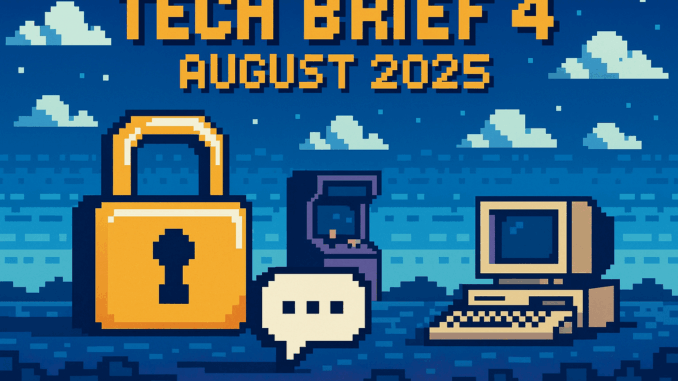
Tech Brief 4 August 2025 lands on a Monday with no gentle easing in. Today’s briefing covers digital dilemmas, public policy pivots, and a whiff of vinegar-soaked nostalgia from the arcades. From legal wrangling over online speech to the government’s latest AI ambitions, and a loving look at seaside amusements, this edition is all about the tension between regulation, innovation, and memory.
Missed yesterday’s Tech Brief? Catch up here before diving in.
X Warns UK Online Safety Act Threatens Free Speech
“Elon Musk’s X says Ofcom’s new powers could silence legitimate voices.” That’s the opening shot in Britain’s latest internet culture war. The Online Safety Act, designed to protect users from harm, is now criticised for overreach; X argues it risks stifling open debate and policing speech too aggressively. The platform, formerly Twitter, claims Ofcom’s enforcement may suppress dissent and chill conversation, echoing fears that have haunted the internet since the first flamewars on Usenet.
This is not the first time the UK has tried to moderate digital spaces. In the 1990s, Demon Internet’s Acceptable Use Policy sparked similar debates about freedom and responsibility. Demon Internet, one of the UK’s earliest internet service providers, played a key role in shaping the early digital landscape. Today, the stakes feel higher, with platforms and regulators locked in a tug of war over who decides what is “safe” online. For users, the question is whether safety and free expression can coexist, or if we are doomed to repeat old arguments with new actors.
Older Brits Turn Off BBC, Tune In to YouTube
Here’s a statistic to chew on: Ofcom reports YouTube viewing among over-55s has doubled in the past year. Why? Many say the BBC feels “samey and boring,” while YouTube offers endless choice: from niche history channels to retro computing tutorials. The shift is more than just a change of screen; it’s a generational moment where the old gatekeepers lose their grip.
There’s a certain symmetry here. Gen-Xers saw the first cracks in scheduled TV when Teletext and VHS let them time-shift their favourites. Now, older viewers are skipping the Radio Times and programming their own evenings, one algorithmic rabbit hole at a time. The BBC’s challenge is to stay relevant in a world where nostalgia and discovery are just a search away. For viewers, it is proof that curiosity doesn’t retire.
Ministry of Justice Launches Three-Year AI Strategy
What does government-grade artificial intelligence actually look like? The UK Ministry of Justice has unveiled a three-year action plan for AI, appointing a new AI officer and introducing risk-assessment frameworks to guide ethical use in public services. The strategy focuses on balancing innovation with safety, aiming to avoid the pitfalls that have plagued early digital rollouts.
Unlike the BBC’s struggle to keep pace with digital tastes, the Ministry is betting big on structure and oversight. Their plan includes regular audits, transparency measures, and a commitment to public trust. These are terms that would have sounded like science fiction during the ZX Spectrum’s heyday. As policymakers grapple with questions of bias and accountability, the move signals that AI is not just for Silicon Valley but a core part of Britain’s evolving digital state.
Classic Seaside Arcades: The Machines That Made Us
Confession time: nothing in modern gaming beats the tactile joy of a battered coin-op at the British seaside. The Guardian’s list of the ten best classic arcade machines reads like a love letter to the 1980s and 1990s. Penny pushers, punch bags, and Hillbilly Shootouts all included. These electro-mechanical wonders were more than entertainment; they were feats of engineering and social glue for a generation raised on chips and 10p coins.
Operators kept these machines alive with ingenuity and a bit of luck, swapping belts and tweaking circuits to keep the fun flowing. We all remember the thrill of seeing technology come alive in the arcades, long before home computers took over. For me, nothing quite matches the sound of a Sega Rally wheel clicking back into position or the neon glow of an Electrocoin Bar-X after a fresh clean. Today’s retro gaming scene owes a debt to these seaside legends, and their whirr, clang, and neon glow still resonate for those who seek out the real thing.
From the Wayback Machine
On This Day: 1873 – Lee de Forest, inventor of the Audion vacuum tube, was born. His creation made radio broadcasting and electronic amplification possible, laying the groundwork for everything from wartime radar to early computers. The Audion’s impact is visible in every device that amplifies a signal, connecting de Forest’s era to today’s digital world. His story is a reminder that foundational innovation often begins with a single breakthrough, one that ripples through generations of technology.
What This Means
Tech Brief 4 August 2025 is a snapshot of recurring questions: who controls speech, who shapes our media diets, and who keeps the old machines running? Today’s stories remind us that every digital leap is built on yesterday’s choices, risks, and repairs. The cycle continues, one Act, algorithm, and arcade at a time.
Take a moment to appreciate the machines and minds that got us here. Stay curious, keep tinkering, and don’t let the magic fade.
Missed yesterday’s Tech Brief? Catch up here

Leave a Reply